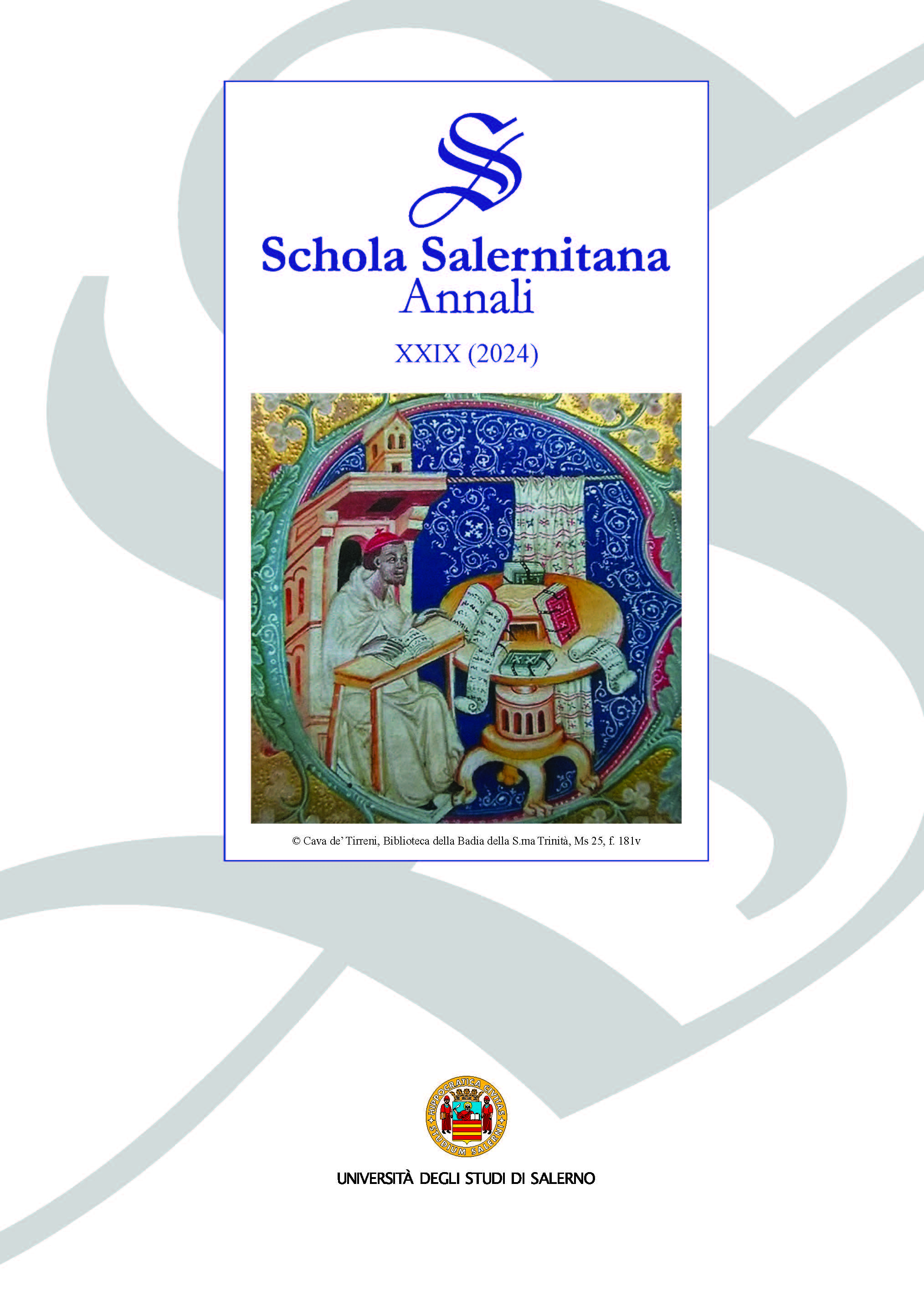Il cavallo di Dauferio e l’onore dei Longobardi
Abstract
Il Chronicon Salernitanum narra come alcuni parenti del principe longobardo di Benevento Grimoaldo storesayz (806-817) abbiano tagliato la coda al cavallo del loro rivale Dauferio come deliberato atto di insulto al suo onore, in conseguenza di un precedente gesto considerato infame nei loro confronti, compiuto da un servo dello stesso Dauferio. Partendo da questo episodio, che corrisponde a una norma dell'Edictum Rothari, il presente lavoro tenta di ricostruire, attraverso l'esame di fonti giuridiche e letterarie, il concetto di onore tipico della cultura e della società longobarda, la sua specifica percezione, rappresentazione e tutela giuridica.
Downloads
Riferimenti bibliografici
Fonti
Chronicon Salernitanum = Chronicon Salernitanum. A critical edition with studies on literary and historical sources and on language, ed. U. Westerbergh, Stockholm/Lund 1956 (Studia latina Stockholmiensia, 3).
Erchemperti Historia Langobardorum Beneventanorum = Erchemperti Historia Langobardorum Beneventanorum, ed. G. Waitz, in Monumenta Germaniae Historica, Scriptores rerum Langobardicarum et Italicarum, Hannoverae 1878.
Le leggi dei Longobardi = Le leggi dei Longobardi. Storia, memoria e diritto di un popolo germanico, a cura di C. Azzara – S. Gasparri, Roma 2005.
Origo gentis Langobardorum = Origo gentis Langobardorum. Introduzione, testo critico, commento, a cura di A. Bracciotti, Roma 1998,
Paolo Diacono, Storia dei Longobardi = Paolo Diacono, Storia dei Longobardi, a cura di L. Capo, Milano 1992.
Studi
Azzara, I mezzi di prova = C. Azzara, I mezzi di prova nel diritto dei Longobardi, in Medioevo e Mediterraneo; incontri, scambi e confronti. Studi per Salvatore Fodale, a cura di P. Sardina – D. Santoro – M.A. Russo – M. Pacifico, Palermo 2020, pp. 57-67.
Bedina, Grimoaldo = A. Bedina, Grimoaldo, in Dizionario Biografico degli Italiani, 59 (2002), pp. 676-678.
Bertolini, Dauferio = P. Bertolini, Dauferio, detto il Profeta, in Dizionario Biografico degli Italiani, 33 (1987), pp. 70-73.
Bonnini, Le donne violate = A. Bonnini, Le donne violate. Lo stupro nell’Italia longobarda, in «Nuova Rivista Storica», XCV/1 (2011), pp. 207-248.
Gasparri, La cultura tradizionale = S. Gasparri, La cultura tradizionale dei longobardi. Struttura tribale e resistenze pagane, Spoleto 1983.
Giuffrè, La repressione criminale = V. Giuffrè, La repressione criminale nell’esperienza romana. Profili, Napoli 1993.
Oldoni, Anonimo Salernitano = M. Oldoni, Anonimo Salernitano del X secolo, Napoli 1972.
Ortalli, La pittura infamante = G. Ortalli, «…pingatur in Palatio…». La pittura infamante nei secoli XIII-XVI, Roma 1979.
Pohl, Werkstätte der Erinnerung = W. Pohl, Werkstätte der Erinnerung. Montecassino und die langobardische Vergangenheit, Wien 2001.
Salvioli, Storia della procedura = G. Salvioli, Storia della procedura civile e criminale, in Storia del diritto italiano, a cura di P. Del Giudice, III, parte I, Milano 1925.
Santalucia, Diritto e processo penale = B. Santalucia, Diritto e processo penale nell’antica Roma, Milano 1998.
Santalucia, La giustizia penale = B. Santalucia, La giustizia penale in Roma antica, Bologna 2013.
Santoro, Germ. Arga- = V. Santoro, Germ. Arga-, iniuriosum verbum. Aspetti etimologici e semantici, Roma 2002.
Sarti, Tre itinerari = N. Sarti, Tre itinerari di storia giuridica: i manoscritti, i giuristi, gli istituti, Torino 2007.
Tagliente, Anonimo Salernitano = A. Tagliente, Anonimo Salernitano. Indagini su un cronista longobardo del X secolo, Brescia-Spoleto 2024 (Centro Studi Longobardi. Ricerche, 10).
Copyright (c) 2024 Claudio Azzara

This work is licensed under a Creative Commons Attribution 4.0 International License.
Gli Autori che pubblicano su questa rivista accettano le seguenti condizioni:
a. Mantengono i diritti sulla loro opera e cedono alla Rivista il diritto di prima pubblicazione, rilasciata con Licenza Creative Commons Attribuzione 4.0 Internazionale - CC BY 4.0 che permette "di riprodurre, distribuire, comunicare al pubblico, esporre in pubblico, rappresentare, eseguire e recitare l'opera", indicando la paternità intellettuale del contributo (citando correttamente l'autore e il titolo della rivista) e la prima pubblicazione sulla presente Rivista.
b. Possono aderire ad altri accordi di licenza non esclusiva per la distribuzione della versione dell'opera pubblicata (es. depositarla in un archivio istituzionale o pubblicarla in una monografia), a patto di indicare che la prima pubblicazione è avvenuta su questa Rivista.
c. Al momento della proposta di pubblicazione, sono tenuti a dichiarare che il contenuto e l’organizzazione dell’opera è originale e non compromette in alcun modo i diritti di terzi né gli obblighi connessi alla salvaguardia di diritti morali ed economici di altri autori o di altri aventi diritto, sia per testi, immagini, foto, tabelle sia per altre parti di cui il contributo può essere composto. L’Autore dichiara altresì di essere a conoscenza delle sanzioni previste dal codice penale e dalle leggi speciali per l’ipotesi di falsità in atti ed uso di atti falsi. Schola Salernitana - Annali è esente da qualsiasi responsabilità di qualsivoglia natura, civile, amministrativa o penale, e sarà dall'autore tenuta indenne da qualsiasi richiesta o rivendicazione da parte di terzi.







